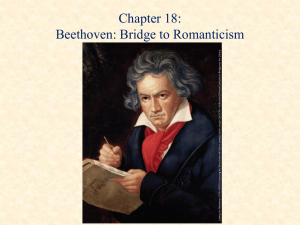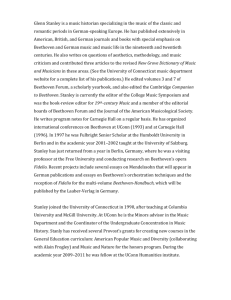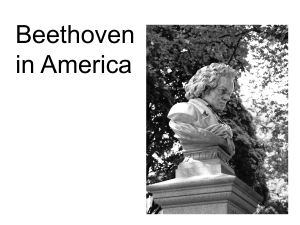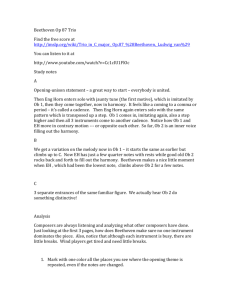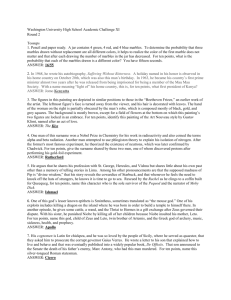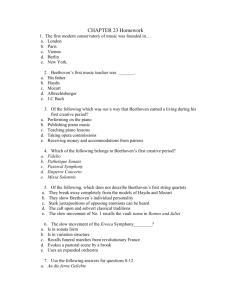Beethoven-and-His-Hero
advertisement
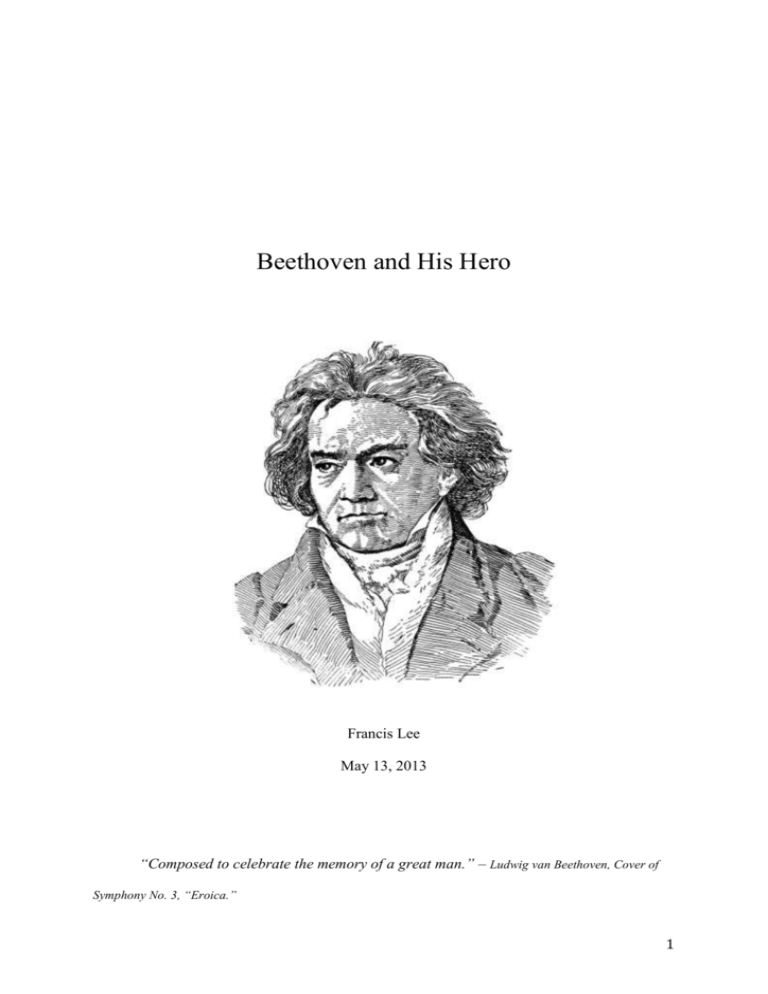
Beethoven and His Hero Francis Lee May 13, 2013 “Composed to celebrate the memory of a great man.” – Ludwig van Beethoven, Cover of Symphony No. 3, “Eroica.” 1 Ludwig van Beethoven’s political ideas are not well known. He remained ambiguous regarding his true thoughts on politics around him. He was known to be a conformist, donning a different political persona every time there was a major shift in the political mood, so that he could further advance his career and ambitions.1 However, he admired Napoleon Bonaparte, almost idolized him to the extent that he even composed his third symphony with Napoleon in mind. Yet, he was absolutely disgusted when Napoleon crowned himself Emperor in 1804, clearly shown in a conversation he had with a close friend when he said, “Is he then, too, nothing more than an ordinary human being? Now he, too, will trample on all the rights of man and indulge only his ambition. He will exalt himself above all others, become a tyrant!”2 He was so enraged by this that, according to the same friend, he ripped apart the title page of the third symphony that bore the name Bonaparte and threw it on the floor.3 However, his anger, strong as it was, did not prevent him from publishing the most radical symphony by the standards of his time under the title Sinfonia Eroica, the Heroic symphony, dedicated to “a great man,” which can be inferred to be Napoleon Bonaparte.4 It is difficult to understand why, even after his great disappointment in Napoleon, he decided to dedicate the Eroica symphony to Napoleon. Yet, bearing in mind the different circumstances in which he was placed at the time and his underlying political views, it becomes clearer why Beethoven decided to finish composting the Eroica symphony and consequently, dedicate it to Napoleon. In Beethoven’s eyes, despite his coronation as emperor, Napoleon Bonaparte embodied the ideals of the French Revolution, ideas Beethoven is likely to have identified with. The French Revolutionary ideals are clearly visible in the emotions that he conveyed in 1 Maynard Solomon, Beethoven (New York: Schirmer Books, 1998), 117. Solomon, 173. 3 Solomon, 173. 4 Solomon, 183. 2 2 most of his compositions written during the early 1800s. The French Revolution and Napoleon provided Beethoven with a new inspiration that drastically changed the style of his music during his successful period in Vienna starting around the 1790s lasting close to his death. Napoleon also embodied a “hero” in Beethoven’s mind – whom Beethoven may have identified with – having risen from a middling background as an Italian immigrant in France with little money to a prominent military commander, then First Consul, and finally, Emperor of France.5 It is probable, that for these reasons, Beethoven’s admiration of and enthrallment with Napoleon persisted even after his near complete disillusionment with Napoleon’s qualification as the ideal hero. Beethoven was born in Bonn, into a family with a long lineage of electoral court musicians, in December of 1770, at least, according to official documents, he was. He had always convinced himself that he was in fact, born in 1772, not 1770, and that all of the documents that seemed to prove him wrong were themselves, incorrect.6 His father, Johann Beethoven, was a tenor and a music pedagogue in the electoral court. His grandfather, Ludwig, was a renowned bass singer and Kapellmeister at the electoral court in Bonn.7 Johann showed great contrast to Beethoven’s grandfather, Ludwig. Johann had never been as skilled or as successful as Ludwig had been. Johann treated his son, Beethoven, so brutally and with such insensitivity that young Beethoven developed a somewhat of an adverse reflex against his father, from whom he began taking music lessons. Although Beethoven showed genuine talent in improvisation as a child, his father was quick to suppress such hints of genius, citing young Beethoven’s unpreparedness for improvisations.8 Naturally, young Beethoven, instead of taking his father as a role model, took his grandfather, the successful 5 Jackson J. Spielvogel, Western Civilization (Boston: Wadsworth, Cengage Learning, 2012) 599. Solomon, 3. 7 Solomon, 3. 8 Solomon, 28. 6 3 and talented musician and Kapellmeister, Ludwig.9 Beethoven’s early musical career started in Bonn as the assistant court organist, taking lessons under Christian Gottlob Neefe, composer and the court organist at the electoral court of Bonn.10 Being an extreme perfectionist and a hard worker, During his early years, he developed somewhat of a fame for himself as a highly skilled and talented keyboardist, playing not only for masses at the court, but also for private parties and evening gatherings at some of the prince-elector’s acquaintances, some of whom later became a great fan and patron of Beethoven during his later years in Bonn and early years in Vienna. Between 1792 and his death in 1827, Beethoven lived mostly in Vienna, under the patronage of various members of the aristocracy in the Habsburg empire.11 During his early years, Beethoven assumed the role of successor to Mozart, Haydn, Gluck, and other great classical masters, composing pieces based on the classical models then set.12 From the 1790s and into the early years of the new century, he enjoyed a time of prolific achievements, writing at a faster pace and with greater efficiency than ever before, and perfected the socalled classical style in his music.13 However, recognizing that he had reached the culmination of his classical composition and imitation of the great masters Haydn, Mozart, and Gluck, and feeling the need for a new, original, and distinguishing voice for himself, he began his search for a new, radically different style of music. He began experimenting with the pianoforte, creating new versions of the pianoforte with greater range, heavier action for greater dynamic control, bigger tone, and greater versatility.14 Describing this musical adventure and experimentation, he wrote to a friend saying, “One can make the pianoforte sing.” Beethoven experimented with dynamics and tonal representations during this time, searching for ways to convey more emotion through the use of greater dynamics – going 9 Solomon, 22. Solomon, 33. 11 Solomon, 77. 12 Solomon, 125~126. 13 Solomon 126. 14 Solomon, 129. 10 4 from soft to loud on a much wider scale. The music that resulted from this experimentation was filled with brilliance, passion, and novel harmonic structure along with variations in tempo.15 This dramatic change in his music furthered in the years that followed. The Eroica Symphony is a first generation offspring of this new and revolutionary style of music. Dramatic changes in tempo, a wide range of dynamics and variations in harmonic structures never seen before clearly contrast with the first two symphonies, which embodied a steadier and less passionate mood, similar to the works of the classical masters. The spark for this revolutionary symphony can be traced to the revolution in France and Napoleon Bonaparte. Beethoven viewed the passionate revolutionary spirit in France as the long-awaited rise of his life-long passion for the enlightened ideals supporting reasoning and freedom.16 In previous years, a conservative political and social mood deterred Beethoven from expressing his passion for the freedom of logic, reasoning, and passionate emotions, as going against the accepted tastes would have caused a major financial downturn for the rising composer. However, the revolutionary upheavals in France and the subsequent era provided inspiration and the opportunity for Beethoven to finally compose radically different. Several pieces were written in this radical fashion: Piano sonatas in D, A, and E-flat major, in A minor, F, A major, and C Minor, the Kreutzer sonata, and chamber music for strings are just a few of the several pieces written during this radical transformation stage in his music. Contemporaries termed this new style of music was termed the Heroic style, as it contained the emotions of the ‘heroic’ people of France standing up against the tyranny of an oppressive monarchy. When Napoleon rose to political prominence as First Consul, this Heroic style evolved to fit the heroic image that Beethoven saw in Napoleon, which was then, employed in the composition of the Eroica symphony. 15 16 Solomon, 130. Solomon, 117. 5 Musically, the Eroica symphony was revolutionary in that parts of the symphony broke away from the traditional structures and progressions of classical symphonic traditions. The finale of the symphony was so radical that even today, contemporaries still do not have a name for the style that the finale embodies.17 With a thematic entrance in the beginning of the finale, he builds up the thematic tune in the bass lines of the first few measures. After the introduction of the theme, he adds on other voices on top of the bass thematic line. He gradually continues this building and adding progression in small steps, a style also implemented in the second movement of the seventh symphony and more famously, the lines that act as a prelude to the big Ode to Joy moment in the ninth symphony.18 In the Eroica, after the almost seemingly canonic, or voice by voice entrances of the theme, he reorganizes the theme into fugues, a style of composition that bases solely on a theme tune that is introduced by one part then taken up by another, with, at its pinnacle, all of the parts interweaving with each other on the same, though reflected melodies. All of this, he implemented in the Eroica symphony, contrasting sharply with the then established mode or method of symphonic composition. Beethoven admired the background of and the ideals of Napoleon. As stated before, he admired the fact that Napoleon, as an Italian lawyer’s son who immigrated to France at a young age, was able to rise through the ranks as a military officer and become First Consul and eventually, emperor.19 Even after Napoleon’s coronation as Emperor and supposed regression into the ranks of other tyrannical and oppressive rulers, Beethoven admired and revered Napoleon’s humble background, intelligence, and leadership.20 Even after Beethoven’s near total disillusionment with the real Napoleon, he was still captured by the earlier, First Consul Napoleon’s heroic attributes and fully intended to complete the Eroica 17 Lewis Lockwood, Beethoven: The Music and The Life (New York: W.W. Norton & Company, 2003), 205. Lockwood, 205. 19 Solomon, 181. 20 Solomon, 181. 18 6 Symphony that was, even then, still dedicated to the early Napoleon. It is likely that Beethoven saw in Napoleon, an image of himself. Beethoven had risen from a common background in Vienna as a foreigner, to the socially respected and roughly equal to the aristocracy in Vienna.21 He held himself to higher moral and social values than most others. Just like Napoleon, he rose through the ranks purely out of merit and luck, with no help from birth-related connections or wealth. Seeing this, it may not be a far stretch to say Beethoven admired Napoleon not only because of the revolutionary ideals that Napoleon embodied that Beethoven adored, but also because he saw a reflection of himself in Napoleon and therefore, was able to identify with Napoleon. As much as he was enthralled with the principles and ideals of the French Revolution and Napoleon Bonaparte, Beethoven remained, in Vienna. His infatuation with French ideals ended shortly after Napoleon crowned himself emperor, which, in Beethoven’s perspective, showed a lack of real imagination. Yet his music reflects no such disillusionment. The heroic style, which was based on Napoleonic and French revolutionary era sentiments, continued to persist throughout Beethoven’s late middle-period works and well into his final few works. The Eroica Symphony, although it had been renamed from the Bonaparte Symphony, was nonetheless published “to celebrate the memory of a great man,” Napoleon.22 Therefore, it is fair to conclude that Beethoven, as disappointed as he was with the end results of Bonapartism, was reverent and admiring of the humble backgrounds from which Napoleon arose to power, and in homage to the passionate sentiment of the French Revolution which was, in his eyes, a people’s revolution, full of the enlightened people’s emotions, he used them as motif for his original style of music that distinguished him from the great classical masters. 21 22 Solomon, 113. Solomon, 183. 7 Bibliography Forbes, Elliot. Thayer’s Life of Beethoven. Princeton, New Jersey: Princeton University Press, 1964. Kolodin, Irving. The Interior Beethoven: A Biography of The Music. New York: Alfred A. Knopf, 1975. Lockwood, Lewis. Beethoven: The Music and The Life. New York: W.W. Norton & Company, 2003. “Ludwig van Beethoven.” ClipArt ETC. http://etc.usf.edu/clipart/79800/79864/79864_beethoven.htm Solomon, Maynard. Beethoven: Second, Revised Edition. New York: Schirmer Books, 1998. Spielvogel, Jackson J. Western Civilization. Vol. C. 8th ed. Edited by Nancy Blaine, Margaret McAndrew Beasley. Boston: Wadsworth Cengage Learning, 2012. 8
